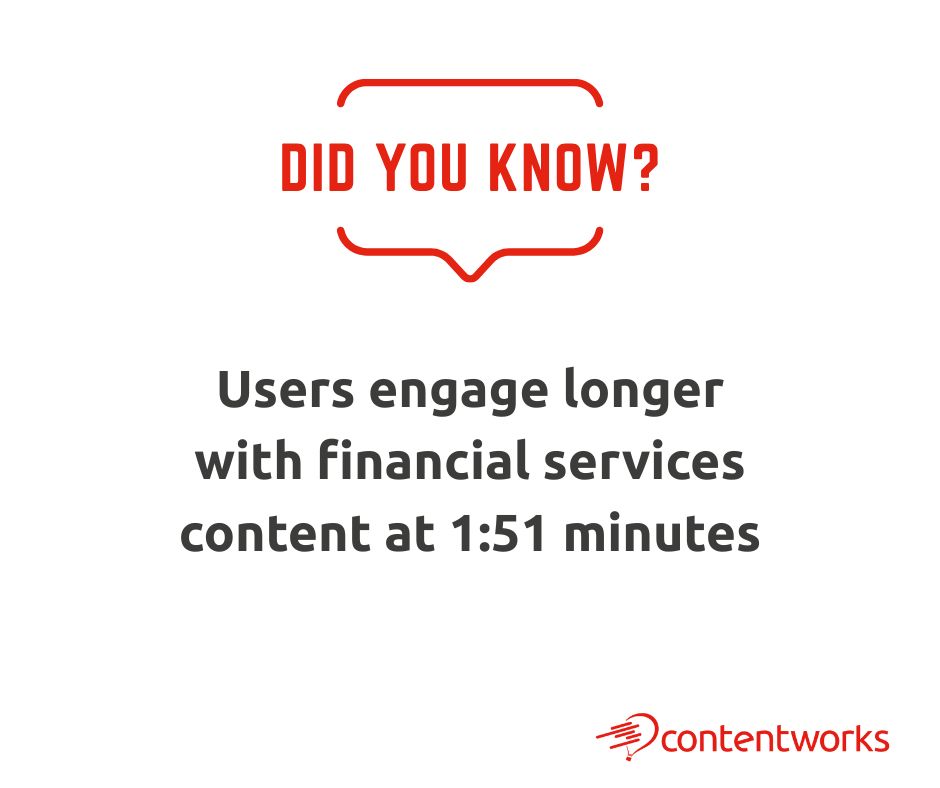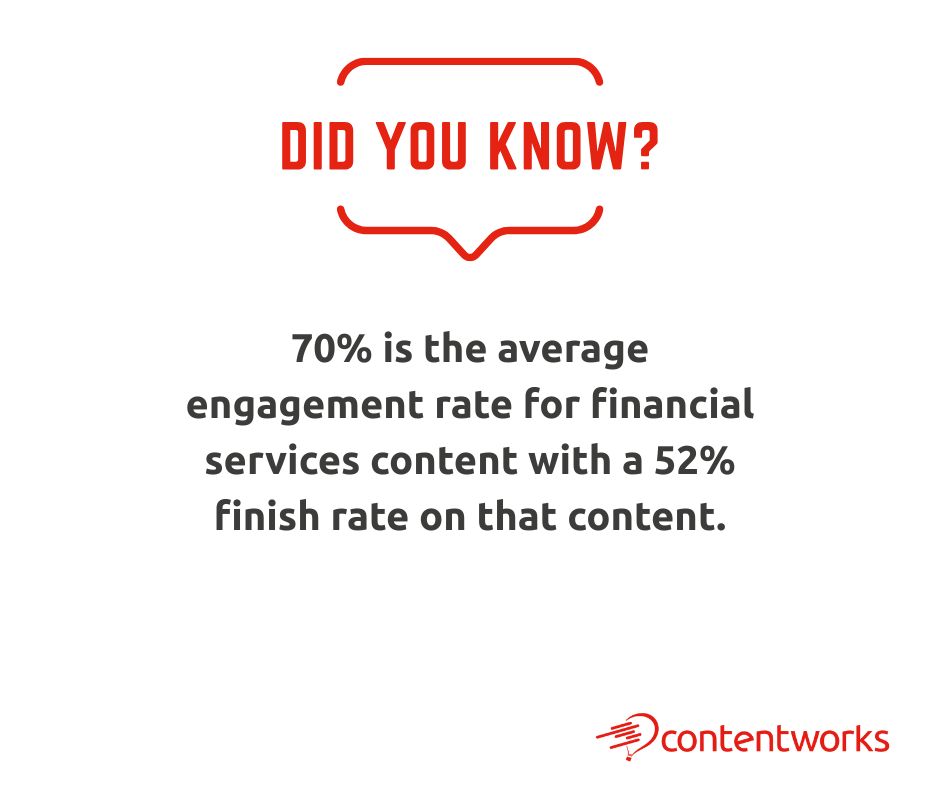In an industry where trust and credibility are paramount, financial institutions must leverage content marketing to build long-term relationships with their audience. By delivering valuable insights through blogs, newsletters, and social media, banks and financial service providers can position themselves as trusted advisors rather than just service providers. Here’s what content marketing for financial institutions looks like in 2025.
Financial Content Marketing – The Stats
87% of B2B marketers reported that content marketing helped them create brand awareness in the last 12 months. The well-worn phrase that content is king still holds true, but the shape of that content is changing. Recent research conducted by the Content Marketing Institute shows that the most used content types are:
- 92% short articles/posts
- 76% videos
- 75% case studies
- 69% long-form articles/posts
- 57% infographics
- 51% used ebook/white papers
Content marketing for financial institutions is tracking similar figures to the above but also showing some specific results:
- The most popular activities for financial marketers are social media at 77%, display ads at 62% and video content at 53%.
- Users engage longer with financial services content at 1:51 minutes
- 70% is the average engagement rate for financial services content with a 52% finish rate on that content.

In a highly competitive and regulated environment, finance firms have particular needs that their content needs to address. Whether it’s banks, credit unions, asset management firms, fintechs or payment providers, creating high-quality, compliant, and data-driven content is essential for success. If you’re undertaking content marketing for your financial institution, collaborating with a specialist financial content marketing agency has many advantages.
Financial Industry Expertise
Financial content marketing demands a high level of industry expertise. Unlike other industries, financial institutions deal with complex products and services such as forex trading, wealth management, insurance, banking, and investments.
To create impactful content, marketers must have an in-depth understanding of financial products and services. Being able to break down technical jargon into simple, digestible information is key to engaging different audience segments, from retail investors to high-net-worth individuals (HNWIs).
Knowledge and comprehension across a variety of financial sectors is also important. Content marketing strategies should be tailored to specific financial entities, whether they are traditional banks, neo banks, forex brokers, asset managers, or fintech companies.
A specialised financial content marketing agency will have developed specific storytelling skills. They understand their audience in order to craft compelling narratives around financial planning, investment strategies, or risk management to make the information more relatable to customers.
Compliance & Regulatory Knowledge
Financial marketing is highly regulated, making compliance a critical factor in content creation. Content must adhere to regulations set by organisations such as the SEC, FCA, ASIC and CySEC just to name a few. There are also privacy guidelines like GDPR to adhere to.
A financial content agency is cognizant of regulations and able to work closely with your compliance teams. Content delivered should meet industry standards and not make misleading claims. While internal compliance teams are ultimately responsible for this content, in a busy marketing department sending compliant content means greater efficiency.
One of the most crucial advantages a specialised agency can bring to the table is the ability to walk the fine line between creating engaging content that is also compliant. That means staying updated on latest marketing and industry trends along with constant regulatory changes.
Contentworks Agency produces a free monthly round up of the latest regulatory changes worldwide.
Data-Driven Content Strategies
They say that if you can’t measure it, you can’t manage it. A financial content marketing agency understands which strategies to implement and data to analyse to effectively target financial audiences. This data-driven approach covers a number of areas including:
- Setting KPIs, tracking engagement and ROI: Content marketing goes beyond the last-click attribution and looks at the entire client funnel. Setting realistic conversion rates and engagement metrics sets up your content marketing efforts for success.
- Search engine optimisation: Content for finance falls under Google’s YMYL (your money your life) category. This means ensuring your content doesn’t get your Google account blocked for failing to meet standards. Financial content must also demonstrate Experience, Expertise, Authoritativeness, and Trustworthiness (E-E-A-T) to rank well in search results.
- Answer engine optimisation: Now there are AEO strategies that need to be implemented, as well as optimising for voice search.
- A/B testing and performance optimisation: Experimenting with different headlines, content formats, and CTAs helps identify what resonates best with the target audience.
Building Trust and Thought Leadership
With thousands of online financial scams, building trust is the foundation of the financial industry. Your specialised agency understands that customers want to feel confident that they are receiving credible and transparent information. Thought leadership content positions financial institutions as trusted advisors by creating ad publishing authoritative reports and whitepapers. Industry insights and latest market updates help establish credibility and provide value to both institutional investors and retail clients.
The content agency will often ghost-write for financial executives and that means crafting high-level content that shows authority. At the same time, that content needs to resonate with the target audience. It needs to balance complex topics and present them simply. This content can be placed on the website, on 3rd-party publications as part of PR outreach strategy, Linkedin articles or conference speeches.
Creating expert white papers or case studies backed by up-to-date research and with real-world examples enhances a brand’s trustworthiness. Financial institutions will often outsource these lengthy and time-consuming tasks to external providers. They need to trust that their providers are conducting thorough and accurate research.

Specialised Content Formats
Different audience segments consume financial content in various ways, making it important to diversify content formats. Key formats include:
- Blog posts and educational articles. Regularly updated blogs covering investment tips, regulatory changes, and financial planning advice cater to both beginners and experienced investors.
- Video content and webinars. Engaging videos and expert-led webinars simplify complex topics and foster direct audience interaction.
- Infographics and research reports. Visually compelling data presentations help communicate financial trends and statistics more effectively.
- Client success stories. Testimonials and case studies showcasing successful financial planning strategies build credibility and social proof.
Understanding how financial services clients consume content is what a specialist agency can do well. Different messaging is presented to prospective clients along the marketing funnel helping them on their journey to becoming and remaining a client.
Personalised and Integrated Marketing Strategies
To maximise reach and engagement, financial marketing agencies adopt a personalised, omni-channel content approach. To do this effectively they need to tailor content for different audiences. A retail trader is quite different to an institutional investor. A fintech user is different to a traditional banking client. Understanding how to create content for these different segments ensures relevancy.
Your content marketing strategy encompasses a large number of channels. Your website, email strategy, digital advertising, social media and PR require deep understanding of the sector to ensure visibility and engagement. Being branded and know which trends or memes are relevant to your audience take years of experience to get right.
Crisis and Reputation Management
In an industry that deals with other people’s money, reputation is everything. A financial services content marketing agency can help your financial firm prepare a communications and crises management plan. Your strategic plan will include both proactive and reactive tactics.
Proactive reputation management: This consist of publishing positive brand narratives on 3rd-party websites and channels. It allows you to control your story and mitigate any possible future negative press.
Reactive reputation management: Having a plan for different negative scenarios that might occur so you can act quickly, consistently and on brand. Be that a bad customer review, negative press, unhappy affiliate or cyber attack.
To be both proactive and ready for any negative instances, clear and transparent communications to reassure clients, investors, regulators and other stakeholders is crucial. Social listening and monitoring public sentiment allows you to address concerns before they become problematic.
Security & Confidentiality
Content marketing agencies for financial institutions understand they are in a sensitive sector that handles confidential information. They should be prioritising content security through secure processes. This includes encrypted communication channels and secure content management systems to protect client data. Industry standards must be met and adherence to data privacy laws such as GDPR and CCPA. You need to confidently know that all your external providers are working within legal requirements to protect your company and brand.
Many agencies might outsource to other providers to meet your entire needs, so NDAs and confidentiality agreements are a must. Sensitive client information, product developments and safe-guarding company confidentiality is non-negotiable.
If you’re ready to improve the content marketing for your financial institution, book a free zoom with our team.
